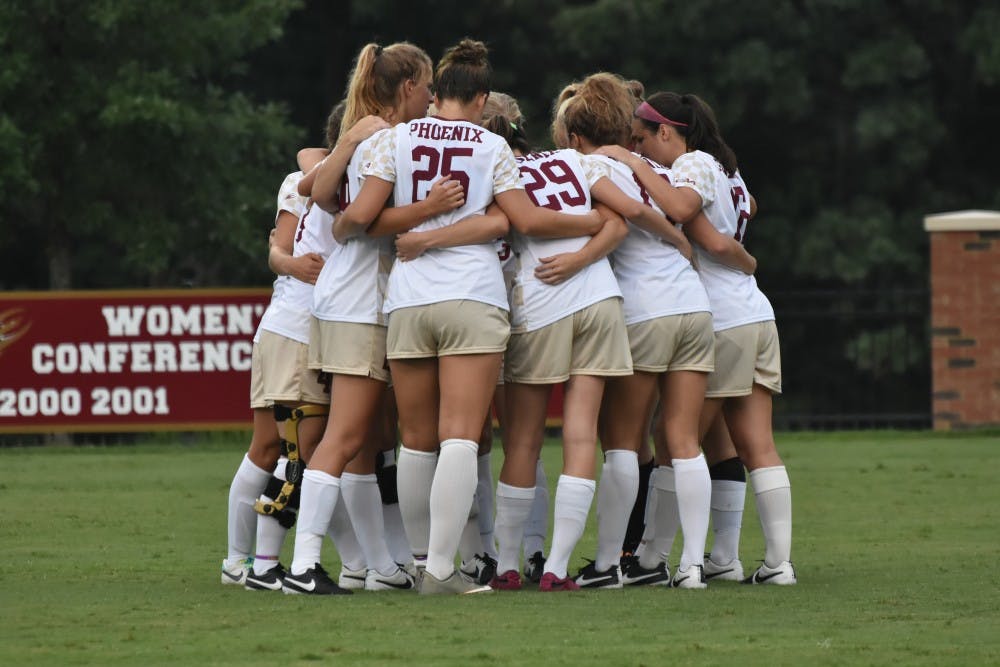Junior midfielder Kelly Siewers didn’t see the defender coming. She was looking to head the ball early in a 2014 match against Appalachian State University, and while she was coming at the ball from the side, her opponent came straight on. Siewers headed the ball, and her opponent headed Siewers.
“She headed Kelly straight in the head,” said head coach Chris Neal, recalling the collision. “It was a very violent collision, just watching Kelly fall in a kind of helicopter spin. The way she landed, I knew it would be really bad.”

Siewers was out for the rest of the season as a result of a severe concussion, taking away a key starter from the Phoenix on the first weekend of the season.
How significant was her absence? One only needs to look to this season and the impact that she’s had for the 4-1 Phoenix, which is off to its best start since 2010. She leads the team in points with five, excluding a goal she scored against Charleston Southern University in the canceled season opener.
She’s also second on the team in shots and fourth in minutes played, a testament to her resolve and ability to stay fit.
“Endurance is not an issue for Kelly,” Neal said. “She’s just one of those kids that has that DNA, she can run for days.”
The recovery process was a long road for Siewers. For weeks after the incident she wasn’t allowed to go to practices or games, confined to her room with concussion symptoms.
“I was sensitive to light, I couldn’t watch TV, I couldn’t even watch our away games on my computer,” Siewers recalled. “I was always having constant headaches.”
She was out of school for five weeks, although she said she was able to stay in all of her classes, thanks to understanding professors. She went to different specialists to figure out why her symptoms persisted, including vestibular therapy to reduce her dizziness as well as vision therapy to correct some deficits that had occurred, particularly in her left eye.
“I kind of had to re-train my left eye how to work again,” Siewers said, adding the tracking was thrown off in her left eye since she had been hit on the left side of her head. The lagging also prolonged headaches, making therapy that much more intensive, and her stay on the sidelines that much longer.
“Just sitting out and watching my teammates play and being on the bench for so long, I was definitely ready to get back out there,” Siewers said. “During the time I sat out, I wished more than anything I could have been playing.”
Siewers went to therapy for six weeks in order to get her balance back, and to improve the tracking in her left eye. She wasn’t able to return to the pitch until the majority of her symptoms were gone, stepping back onto the field in March 2015.
While she has played plenty of minutes so far in the season, the coaching staff is continuing to give her as much rest as possible. In a recent match against South Carolina State University, Siewers played only 35 minutes and was able to rest after the Phoenix jumped out to a 3-0 halftime lead and an eventual 5-0 victory.
“Any chance I get to rest her this year,” Neal said, “I’ll make sure we rest her.”
If you ask Neal, there’s no question about the impact that she’s had so far this season.
Neal said losing Siewers was a significant loss from a performance standpoint. “It’s pretty evident how important it is to have her on the field already,” he said. “She’s a very good player, so I think it’s pretty evident for people that didn’t know her that have seen her play so far this year.”
Siewers is excited about the chance to play again, and is looking forward as the season progresses.
“I couldn’t have gotten through this without the support from my family, friends, coaches and teammates,” she said. “It was the hardest few months of my life and I couldn’t be more grateful for all that they have done. We’ve had a great start to the season so far and I’m looking forward to continuing that into conference play.”


